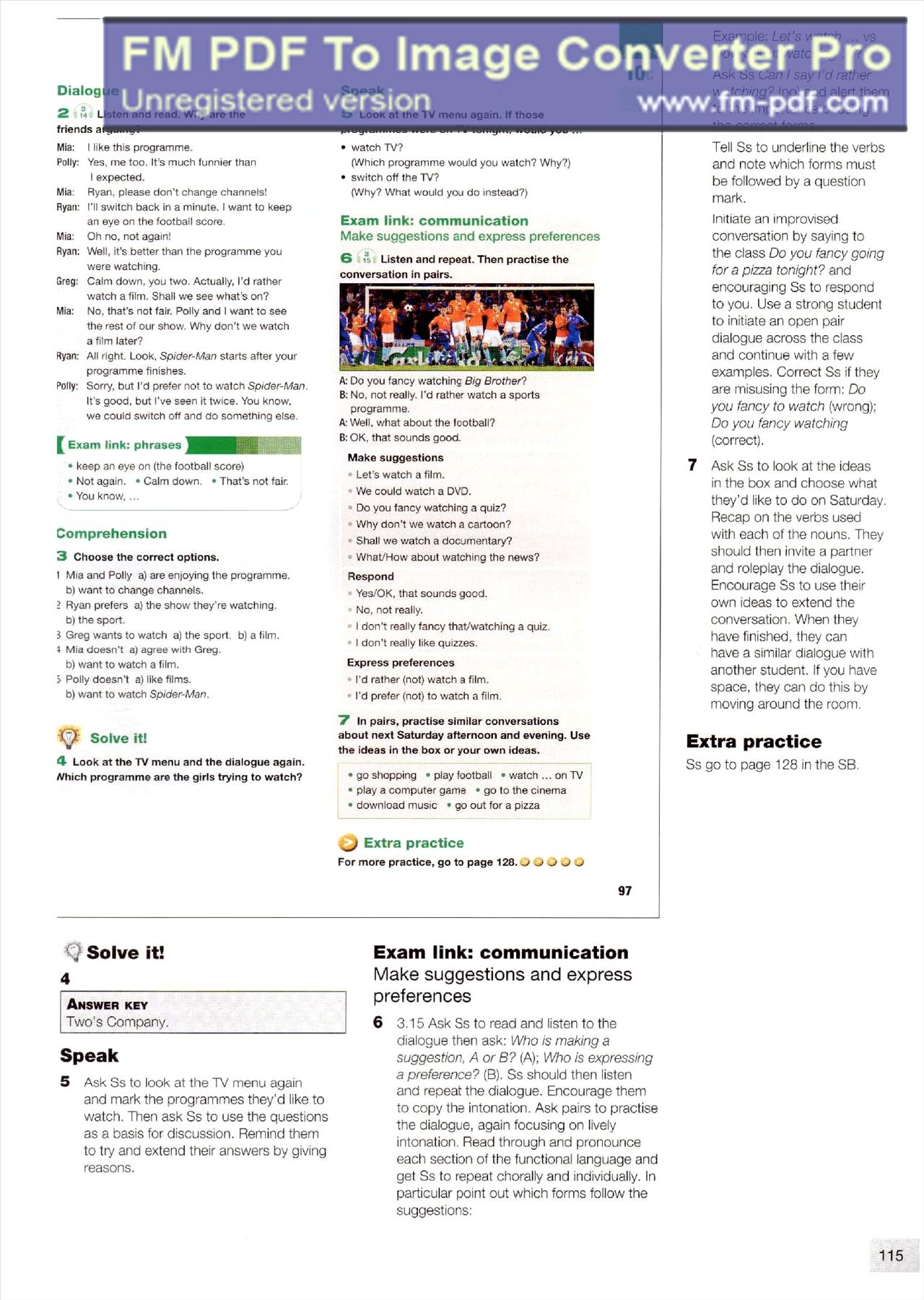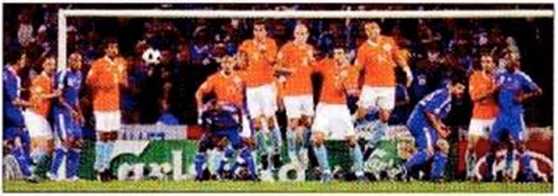Up¾at 3 Teacher's Book podrecznik nauczyciela plus odpowiedzi ,testy,klucz answer key Page 114

3
«4
2
friends a
DialogiB

H1,V-T«IW;
>n and read. W. „ are the
4 ’ •
ook at the IV menu again. If those muum inwiywwiuumo
*
w
Exam link: phrases

Mia: I like this programme.
Polly: Yes. me too. It’s much funnier than I expected.
Mia: Ryan. please don't change channels!
Ryan: ni switch back in a minutÄ™. I want to keep an eye on the football score.
Mia: Oh no. not again!
Ryan: Weil, it's better than the programme you were watching.
Greg: Calm down. you two. Actually, l’d rather watch a film. Shall we see what's on?
Mia: No. that’s not fair. Polly and I want to see
the rest of our show. Why don’t we watch a film later?
Ryan: Ali right. Look. Spider-Man starts after your programme finishes.
Polly: Sorry, but l'd prefer not to watch Spider-Man. It s good. but l’ve seen it twice. You know. we could switch off and do something else
[
• keep an eye on (the football score)
• Not again. • Calm down. • Thafs not fair.
• You know....
Comprehension
3 Choose the correct options.
1 Mia and Polly a) are enjoying the programme.
b) want to change channels.
? Ryan prefers a) the show they’re watching. b) the sport.
3 Greg wants to watch a) the sport, b) a film.
4 Mia doesn't a) agree with Greg. b) want to watch a film.
3 Polly doesn’t a) like films. b) want to watch Spider-Man.
Solve it!
4- Look at the TV menu and the dialogue again. /Vhich programme are the girls trying to watch?
• watch TV?
(Which programme would you watch? Why?)
• switch off the TV?
(Why? What would you do instead?)
Exam link: communication
Make suggestions and express preferences
G i35 Listen and repeat. Then practise the conversation in pairs.

A: Do you fancy watchinę Big Brothers B: No. not really. I’d rather watch a sports programme.
A: Weil. what about the football?
B: OK. that sounds good.
Make suggestions
Let’s watch a film.
We could watch a DVO.
° Do you fancy watching a quiz?
Why don’t we watch a cartoon?
Shall we watch a documentary? What/How about watching the news?
Respond
Yes/OK, that sounds good.
No. not really.
I don’t really fancy that/watching a quiz. I don’t really like quizzes.
Express preferences
l'd rather (not) watch a film.
I’d prefer (not) to watch a film.
~7 In pairs, practise similar conversations about next Saturday afternoon and evening. Use the ideas in the box or your own ideas.
* go shopping • play football • watch ... on TV
* play a Computer gamę • go to the cmema
* download musie • go out for a pizza
Tell Ss to underline the verbs and notÄ™ which forms must be followed by a question mark.
Imtiate an improvised conversation by saying to the class Do you fancy going for a pizza tonight? and encouragmg Ss to respond to you. Use a strong student to initiate an open pair dialogue across the class and continue with a few examples. Correct Ss if they are misusing the form: Do you fancy to watch (wrong); Do you fancy watching (correct).
7 Ask Ss to look at the ideas in the box and choose what they’d like to do on Saturday. Recap on the verbs used with each of the nouns. They should then invite a partner and roleplay the dialogue. Encourage Ss to use their own ideas to extend the conversation. When they have finished. they can have a similar dialogue with another student. If you have space, they can do this by moving around the room.
Extra practice
Ss go to page 128 in the SB.
Q Extra practice
For morÄ™ practice, go to page 128. ^ ^ ^ ^

Solve it!
4__
Answer key
Two’s Company.
Speak
5 Ask Ss to look at the TV menu again and mark the programmes they’d like to watch. Then ask Ss to use the questions as a basis for discussion. Remind them to try and extend their answers by giving reasons.
Exam link: communication
Make suggestions and express preferences
6 3.15 Ask Ss to read and listen to the dialogue then ask: Who is making a suggestion, A or B? (A); Who is expressing a preference? (B). Ss should then listen and repeat the dialogue. Encourage them to copy the intonation. Ask pairs to practise the dialogue, again focusing on lively intonation. Read through and pronounce each section of the functional language and get Ss to repeat chorally and individually. In particular point out which forms follow the suggestions:
115
Wyszukiwarka
Podobne podstrony:
Up?at 3 Teacher s Book podrecznik nauczyciela plus odpowiedzi ,testy,klucz answer key Page 126 FM PD
Up?at 3 Teacher s Book podrecznik nauczyciela plus odpowiedzi ,testy,klucz answer key Page 134 7 -v&
Up?at 3 Teacher s Book podrecznik nauczyciela plus odpowiedzi ,testy,klucz answer key Page 203 2 His
Up?at 3 Teacher s Book podrecznik nauczyciela plus odpowiedzi ,testy,klucz answer key Page 034 Vocai
Up?at 3 Teacher s Book podrecznik nauczyciela plus odpowiedzi ,testy,klucz answer key Page 203 2 His
Up?at 3 Teacher s Book podrecznik nauczyciela plus odpowiedzi ,testy,klucz answer key Page 216 TEST
Up?at 3 Teacher s Book podrecznik nauczyciela plus odpowiedzi ,testy,klucz answer key Page 001 FM PD
Up?at 3 Teacher s Book podrecznik nauczyciela plus odpowiedzi ,testy,klucz answer key Page 005 Conte
Up?at 3 Teacher s Book podrecznik nauczyciela plus odpowiedzi ,testy,klucz answer key Page 006 Conte
Up?at 3 Teacher s Book podrecznik nauczyciela plus odpowiedzi ,testy,klucz answer key Page 009 FM PD
Up?at 3 Teacher s Book podrecznik nauczyciela plus odpowiedzi ,testy,klucz answer key Page 010 : Rea
Up?at 3 Teacher s Book podrecznik nauczyciela plus odpowiedzi ,testy,klucz answer key Page 012 Large
więcej podobnych podstron